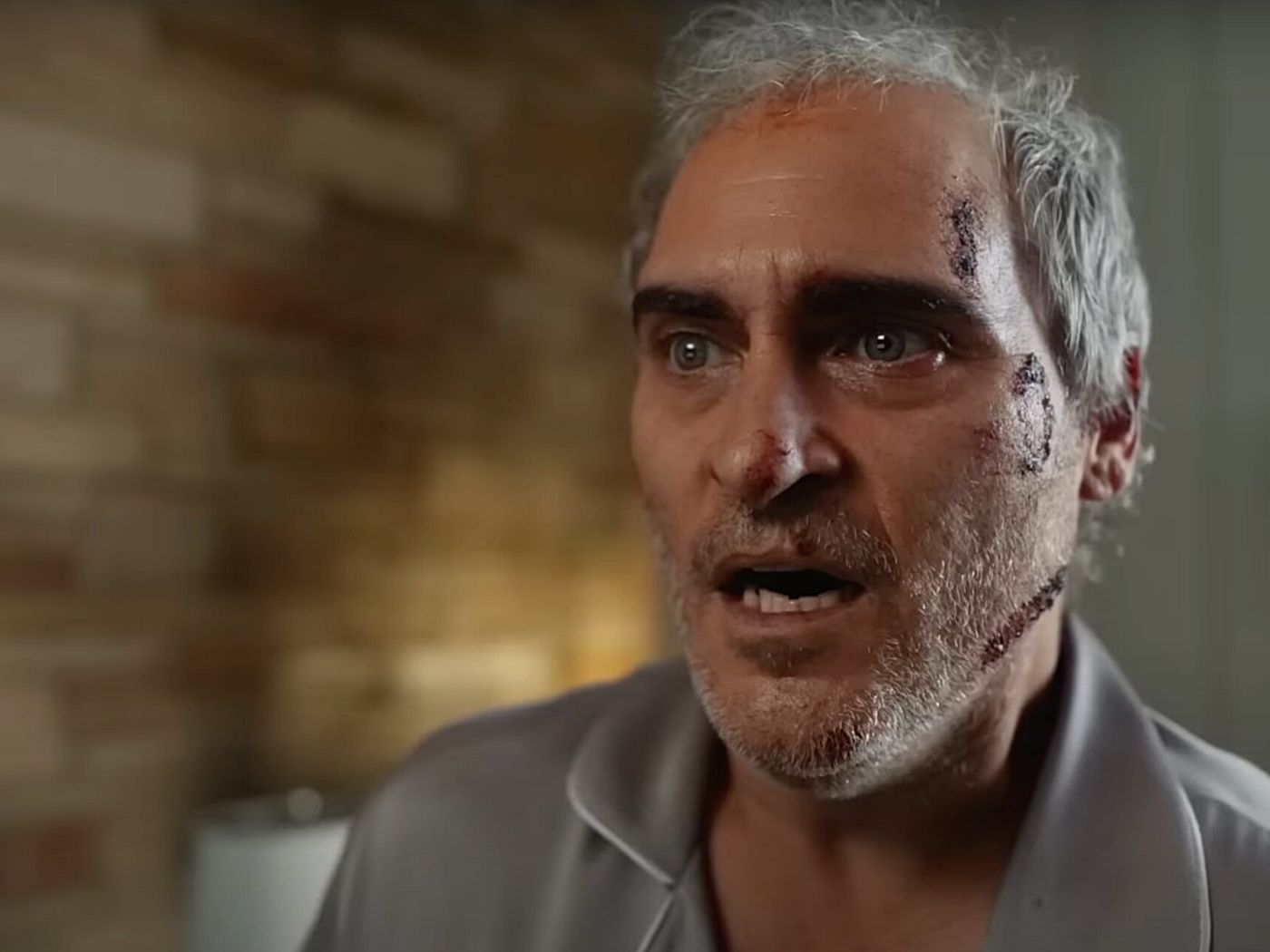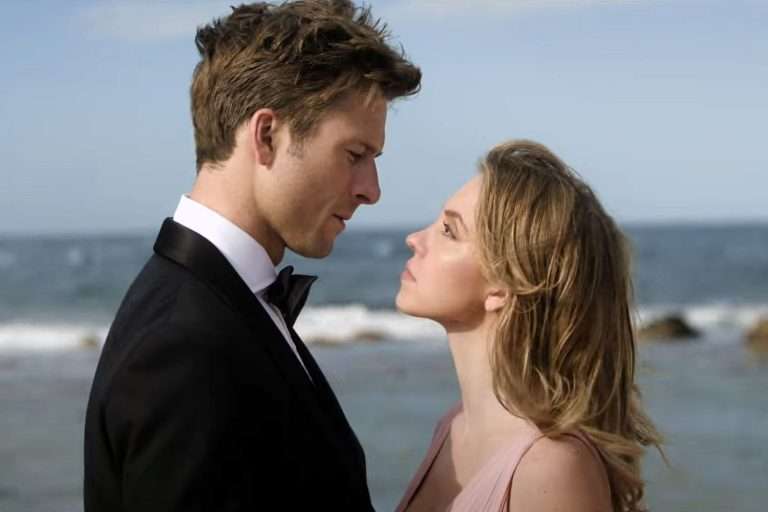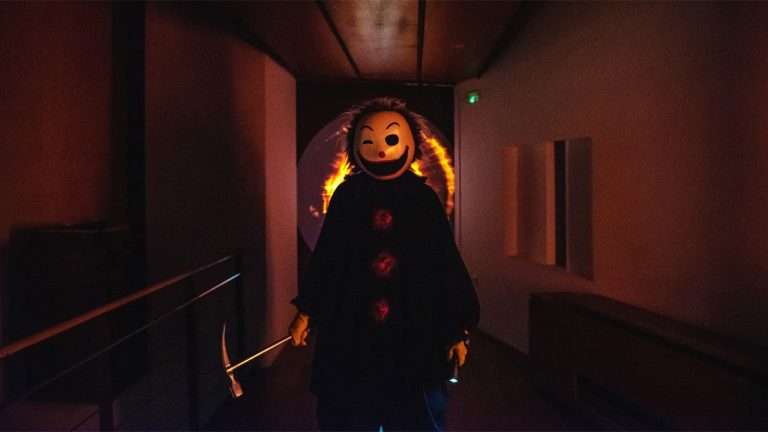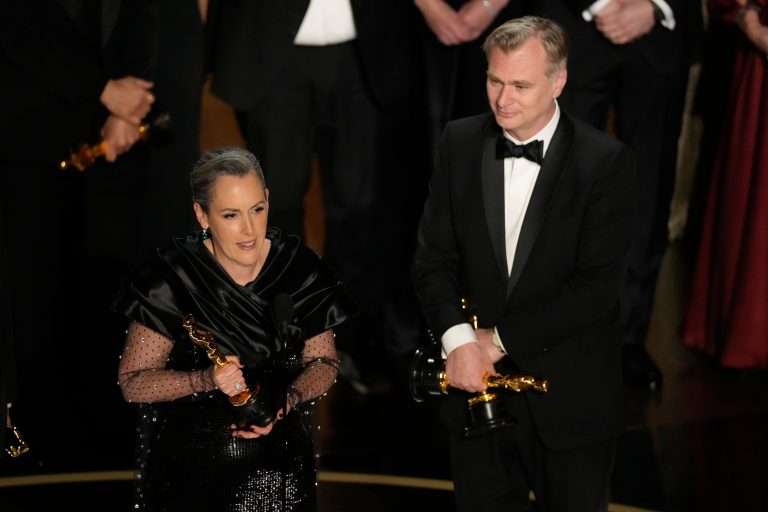Beau is Afraid (2023) Review: Having already caused shock and awe with his previous two films, Hereditary and Midsommar, director, and screenwriter Ari Aster has crafted yet another piece of cinema that is dividing audiences, Beau is Afraid. Starring Joaquin Phoenix, many have proclaimed it his best work yet, whereas others have declared it a career killer. Where his former two films can fit adequately in the horror genre, Beau is Afraid is a black tragicomedy that relies on the ultimate horrors that exist within ourselves.
Coming in at an exhaustive three-hour runtime, Beau is Afraid is, put, a fever dream. From the moment we meet the titular character in the film’s opening scene, there is a tinge of guilt that plagues us. The film opens with Beau, in utero, being born, what we’re given to assume is a traumatic event for those around him as he is not crying and must be resuscitated by doctors.
Then we meet Beau in adulthood, in his therapist’s office, preparing for an impending trip home to visit his mother. The psychiatrist (Stephen McKinley Henderson) presses on about the visit, whereas Beau is fixated on having what he refers to as “the dream” again, a childhood memory involving a bathtub. The disturbingly cheerful therapist concludes by prescribing him a seemingly unpronounceable new medication that must be taken with water and sends him home.
But where is home, exactly? This introduces a central theme to Beau is Afraid, which is fear—a primal instinct every human being possesses, some more than others. Although we don’t yet have much evidence as to what has caused Beau’s mental health issues at this point in the narrative, we don’t need such information to make sense of his internal struggle.
From the mere name of the film, we’re given to understand that Beau is scared. What he is afraid of isn’t important. He’s just someone who operates with a base level of constant fear and loathing in his life. Although mental illness is often genetic, there are still environmental factors that contribute to such afflictions in later life—which is enough to charm the viewer into sticking around for the remainder of Beau’s story.

From his internal perspective, Beau appears to live in a lawless land fraught with acts of inhumanity and violence. A dead body lies rotting in the street, untouched. His graffiti-covered apartment building realistically suggests a rougher part of town that he inhabits, but given the inhumane nature of his surroundings, it’s easier to suggest that the rougher part of the narrative is Beau’s mind.
His flight home to visit his mother is the following afternoon. He buys her a thoughtful gift and handwrites a message on the bottom. He goes to sleep, or at least tries to, as he is concurrently interrupted by flying paper messages sent underneath his door demanding that he turn down his loud music. When this senseless, nonexistent loud music fails to cease, the neighbor turns up their own noise.
Beau majorly oversleeps until barely an hour before his flight the next day. He panics and frantically packs. Just as he’s about to leave his apartment, his luggage and keys are stolen. He calls his mother to inform her of the situation, only for her to condescendingly suggest he’s made it all up. Subsequently, Beau realizes he must take his daily dose of the new medication only to discover there is no running water in his building. He props open his building’s door to run across the street to buy bottled water, is short on money, and imagines all the inhumane street people entering his apartment and locking him out. Another series of events leads him to be crushed in his bathtub, running naked and deranged through the street, and police fail to help him until a vehicle strikes him.
This first act of the film is crafted entirely from Beau’s innermost anxieties, neuroses easily recognizable in ourselves. As innately anxious people, we fear missing our flight the next day. We fear being accused of something we didn’t do, having irreplaceable personal effects stolen, not having water to take a medication that must be taken with water, not having enough money, strangers entering our home, or, the worst of all: having someone who is supposed to love you unconditionally not believe your words.
“I wanted to make a movie that was like a video game but where your character can’t do anything, and none of the buttons work,” Aster told TIME, which is exactly what this part of the film represents. Isn’t everyone’s worst nightmare to be stripped of control?
The remainder of Beau is Afraid follows a far less linear timeline. After being told by a UPS deliveryman (voiced by Bill Hader) that his mother died after being struck in the head by a chandelier in her home, Beau panics and later wakes up in the home of Grace and Roger (Amy Ryan and Nathan Lane), the latter being a surgeon who is supposedly treating Beau’s injuries. They’ve placed an ankle monitor on his body, drug him and themselves, and keep delaying promises to drive him home for his mother’s funeral.
He is mocked and abused by their teenage daughter Toni (Kylie Rogers), who later commits suicide in front of him by drinking paint. Where Grace had become a doting mother figure for Beau, she quickly flips and berates him for killing her daughter. He once again escapes the scene in a panic, running through nearby woods where he meets Penelope (Hayley Squires), a kind, pregnant woman who brings him to a troupe of traveling theatre actors named “The Orphans of the Forest.” So touched by her help, Beau gives her the gift intended for his mother.
Encouraged to take part in a play, Beau imagines the future trajectory of his own life, seeing it play out before his eyes. During this portion, flashbacks reveal a girl named Elaine, whom he met as a child on a cruise with his mother, as well as his mother’s confession to him growing up that his father died during the sexual intercourse that conceived him, instilling a fear in him that he will die if he ever ejaculates. Hitchhiking his way to his mother’s house, he engages in a sexual encounter with a grown Elaine (Parker Posey) that results in her inexplicable death, as well as the revelation that his mother Mona (Patti LuPone) faked her death to see if her son would react appropriately enough according to her high standards.
Aster described Beau is Afraid as being “very Jewish” and something like a “Jewish Lord of the Rings,” which reinforces Beau’s religious affiliation with the themes of guilt and fear. As a child, Mona would claim Beau was actively trying to hurt her if he ever made efforts at establishing a life or sense of self that didn’t involve her. Beau’s recurring dream involving a bathtub in childhood is also revealed in full, in which there are two versions of himself, one who complies and takes his bath and another who demands to know the truth about what happened to his father. Beau believed it was a dream in which Mona locked him in an attic for hurting her, but she reveals that it was simply a memory of actual events.
The film ends with Beau being put on trial by his mother in a kangaroo court in a crowded arena, where he is deemed guilty over and over again for grievances, both large and small, throughout his life. To the impartial observer, it’s more than clear that the trial was another one of Beau’s worst fears, in which he is outed as the bad son—and therefore bad person—that his mother has always told him he is.
As suggested by its title, Beau is Afraid is a film about fear and guilt, but primarily fear. The fears we’re born with, the fears our mind concocts, and the fears we acquire over a lifetime of trying to survive in a world that we are not always well-equipped to face alone. Sadly, some of us don’t ever rise above those fears and are weighed down by them until we sink, like Beau.
Joaquin Phoenix delivers a captivating performance in a role that could have easily been written for his niche of neurotic talent. Ari Aster’s direction and cinematography are admirable enough, but there’s no denying that even the most educated of audiences would have wanted the film to end sooner. Rather, Aster chose to create a unique atmosphere of suffering for both his protagonist and his audience, which in itself is an achievement.


![Beneath the Shadow [2020]: ‘NYAFF’ Review – A Slow-Burn Queer Drama That Withers Before Bloom](https://79468c92.delivery.rocketcdn.me/wp-content/uploads/2020/09/BENEATH-THE-SHADOW-Movie-Review-highonfilms-3-768x512.jpg)

![Old Beast [2018]: ‘NYAFF’ Review](https://79468c92.delivery.rocketcdn.me/wp-content/uploads/2018/07/OLD_BEAST_NYAFF_HOF_1-768x432.png)
![Roots [2021]: ‘KVIFF’ Review – A Distinctively Minimalist Portrait of Landscape and its People](https://79468c92.delivery.rocketcdn.me/wp-content/uploads/2021/08/Roots-2021-768x403.jpg)

